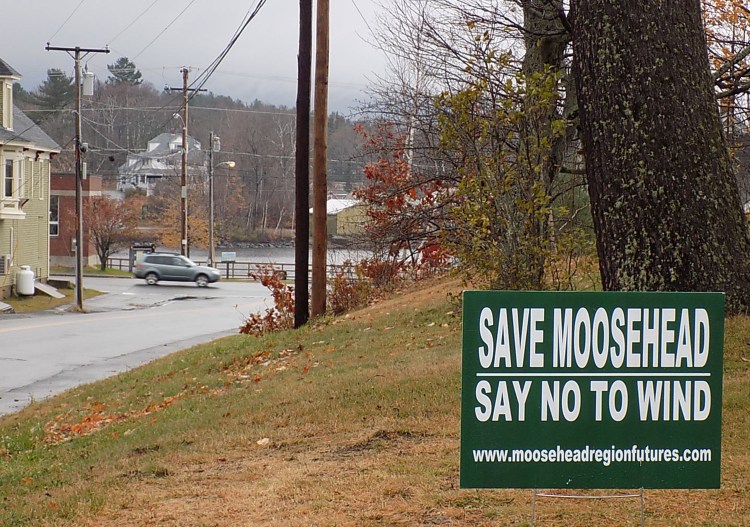Tension is building over potential wind farms in the Moosehead Lake region, where residents and others concerned about the impacts on one of Maine’s signature scenic areas are gearing up to fight two projects that have not yet been formally proposed.
As many as 50 signs protesting wind projects by SunEdison and Everpower were removed by Maine Department of Transportation employees Friday, angering supporters of the Moosehead Region Futures Committee, which opposes the projects and provided the signs to residents and businesses. A transportation department official says the signs in Greenville and Rockwood – which read “Save Moosehead Say No to Wind” – violated state rules because they were within the state’s right of way and were not connected to a candidate or referendum on Tuesday’s ballot.
“The signs in question might be considered a political sign, but there’s currently no item on the ballot regarding wind, so they are not considered legal under (state) statute,” Ted Talbot, spokesman for the DOT, said Monday.
The Maine Travelers Information Services Act allows only certain signs – election signs are among them – within the state’s right of way, Talbot said. The signs that were removed were about 20 feet from the center line; the state’s right-of-way is 33 feet from the center line. Talbot said signs placed outside the right-of-way and closer to homes or businesses would not be removed because they are on private property.
Talbot estimated that employees removed 35 to 40 signs, which were taken to a Department of Transportation garage. The owners have since retrieved them.
Richard McDonald, a Kennebunk resident and board member for the Moosehead Region Futures Committee, said around 200 signs were placed in the area, and he estimated 40 to 50 were removed. The signs were up for two weeks before they were taken down, prompting McDonald and other committee members to ask why they were targeted.
“We’re concerned that (the Department of Transportation) is being a little shortsighted because there were signs out there for no ‘east-west highway.’ They didn’t remove those,” he said. “We are curious as to why we were singled out when there are other similar signs out there. We’re curious to know why DOT in Augusta would even know they’re there.”
Talbot said the signs were removed after the department received a tip from a citizen, which he said isn’t unusual. The department is not releasing the name of the person who provided the tip.
McDonald is concerned that there is a larger free speech issue at play, a sentiment echoed in a blog post by the Citizens’ Task Force on Wind Power – Maine, which opposes wind power projects.
“When MDOT employees were asked who ordered this, they said ‘Augusta,’ ” the blog reads. “Is this what America has come to? Have our First Amendment rights been taken away? Is free speech and the right to protest gone? Does the wind industry now control all of Augusta?”
The Moosehead Region Futures Committee supports a public process to review and revise development proposals in the Moosehead Lake region, a thinly populated area with a wealth of scenic beauty that ranks as one of Maine’s premier outdoor destinations.
Ben Harborne, a spokesman for SunEdison, one of the companies interested in developing a wind farm in the Moosehead region, said Monday the company had no involvement in the removal of the signs.
Neither SunEdison nor Everpower, the other prospective wind power developer, have yet filed permit applications with the Department of Environmental Protection.
SunEdison has installed six meteorological towers to test wind conditions for a project that could have up to 26 turbines on land owned by Plum Creek, a forest management company, west of Moosehead Lake in the Misery Ridge area of Somerset County. SunEdison has completed wind farms in Stetson and Mars Hill and is building the Bingham Wind Project in Bingham.
“At this point, no date has been determined for application submission to the DEP and we will let the public know as the time frame begins to crystallize,” Harborne said of the Moosehead-area project. “We will continue to talk with interested parties in the region in an attempt to ensure that our community benefits packages are tailored to the needs of the region.”
Opponents of the Bingham project have said that wind farms have a negative impact on the scenery in rural Maine. Under DEP regulations, scenic impact is only a consideration in evaluating a wind project if turbines fall within eight miles of the area of concern.
McDonald, the Moosehead Region Futures board member, said the removed signs have been put back up, but didn’t specify whether they were inside the state’s right of way.
“There are more coming,” he said.
Send questions/comments to the editors.




Success. Please wait for the page to reload. If the page does not reload within 5 seconds, please refresh the page.
Enter your email and password to access comments.
Hi, to comment on stories you must . This profile is in addition to your subscription and website login.
Already have a commenting profile? .
Invalid username/password.
Please check your email to confirm and complete your registration.
Only subscribers are eligible to post comments. Please subscribe or login first for digital access. Here’s why.
Use the form below to reset your password. When you've submitted your account email, we will send an email with a reset code.